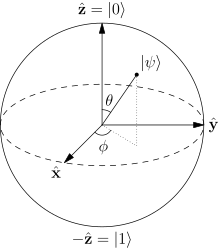Quantum threshold theorem
In quantum computing, the (quantum) threshold theorem (or quantum fault-tolerance theorem), proved by Michael Ben-Or and Dorit Aharonov (along with other groups), states that a quantum computer with a physical error rate below a certain threshold can, through application of quantum error correction schemes, suppress the logical error rate to arbitrarily low levels. Current estimates put the threshold for the surface code on the order of 1%,[1] though estimates range widely and are difficult to calculate due to the exponential difficulty of simulating large quantum systems.[lower-alpha 1] At a 0.1% probability of a depolarizing error, the surface code would require approximately 1,000-10,000 physical qubits per logical data qubit,[2] though more pathological error types could change this figure drastically.
According to quantum information theorist Scott Aaronson:
"The entire content of the Threshold Theorem is that you're correcting errors faster than they're created. That's the whole point, and the whole non-trivial thing that the theorem shows. That's the problem it solves."[3]
See also
Notes
- It is widely believed that it is exponentially difficult for classical computers to simulate quantum systems. This problem is known as the quantum many body problem. However, it is known that quantum computers can perform this in polynomial time with bounded errors, which is one of the main appeals of quantum computing. This is applicable to chemical simulations, drug discovery, energy production, climate modeling and fertilizer production (e.g. FeMoco) as well. Because of this, quantum computers may be better than classical computers at aiding design of further quantum computers.
References
- Fowler, Austin G.; Stephens, Ashley M.; Groszkowski, Peter (2009-11-11). "High-threshold universal quantum computation on the surface code". Physical Review A. 80 (5): 052312. arXiv:0803.0272. Bibcode:2009PhRvA..80e2312F. doi:10.1103/physreva.80.052312. ISSN 1050-2947.
- Campbell, Earl T.; Terhal, Barbara M.; Vuillot, Christophe (2017-09-13). "Roads towards fault-tolerant universal quantum computation". Nature. 549 (7671): 172–179. arXiv:1612.07330. Bibcode:2017Natur.549..172C. doi:10.1038/nature23460. ISSN 0028-0836. PMID 28905902.
- Aaronson, Scott; Granade, Chris (Fall 2006). "Lecture 14: Skepticism of Quantum Computing". PHYS771: Quantum Computing Since Democritus. Shtetl Optimized. Retrieved 2018-12-27.
Further reading
Books
- Nielsen, Michael A.; Chuang, Isaac L. (June 2012). Quantum Computation and Quantum Information (10th anniversary ed.). Cambridge: Cambridge University Press. ISBN 9780511992773. OCLC 700706156.
Papers
From The Journals of the American Physical Society:
- Blueprint for fault-tolerant quantum computation with Rydberg atoms 14 Nov 2017 (Paywall with Abstract)
- Fault-tolerant quantum computation with nondeterministic entangling gates 16 Mar 2018 (Paywall with Abstract)
From the ArXiV:
- Reliable Quantum Computers 26 Aug 1997
- Fault-tolerant quantum computation 19 Dec 1997
- A note on threshold theorem of fault-tolerant quantum computation 25 Jun 2010
- Level Reduction and the Quantum Threshold Theorem 11 Jul 2011
- Universal fault-tolerant quantum computation with Bacon-Shor codes 4 May 2017
- High-threshold fault-tolerant quantum computation with analog quantum error correction 6 Mar 2018
- Efficient Preparation of Large Block Code Ancilla States for Fault-tolerant Quantum Computation 22 Mar 2018
External links
- Gil Kalai. "Perpetual Motion of The 21st Century?".
- Scott Aaronson. "PHYS771 Lecture 14: Skepticism of Quantum Computing": «The entire content of the Threshold Theorem is that you're correcting errors faster than they're created. That's the whole point, and the whole non-trivial thing that the theorem shows. That's the problem it solves.»
